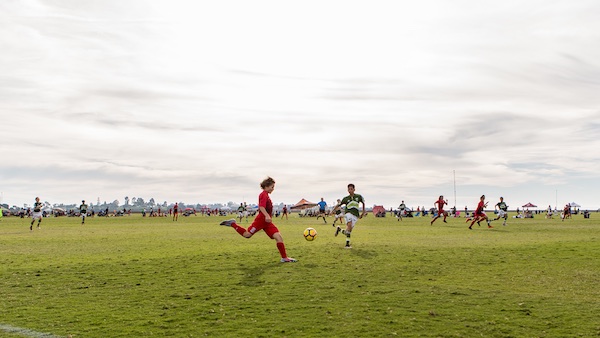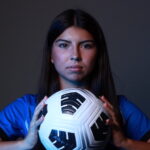My 10-year-old is a star, now what? Advice on parenting, coaching elite young players

 I spend a lot of time in my consulting work speaking with parents of young players who got cut from a team because they were a bit small, a bit slow, or not good enough to help their team win yet. These families want to know what to do next, and I encourage them to take a long-term perspective, and do things to keep their kids involved and playing. Parenting a kid who is struggling is tough.
I spend a lot of time in my consulting work speaking with parents of young players who got cut from a team because they were a bit small, a bit slow, or not good enough to help their team win yet. These families want to know what to do next, and I encourage them to take a long-term perspective, and do things to keep their kids involved and playing. Parenting a kid who is struggling is tough.
But what about if the shoe is on the other foot? What if your son or daughter is the elite player, the coach’s favorite, the one who plays all the games, never gets subbed, and is asked to play on every all star team around? What then?
…only about 10 percent of elite 10-year-old athletes are still elite at 18. Only eight percent of Nobel Prize winners and world champions were child prodigies.
Now, I know some of you are saying “Yeah, nice problem to have, my kid’s the best, boo hoo.” But early success is often a difficult situation that comes with its own pitfalls. Players can be ostracized from the group for getting special treatment or recognition. Players can get bored by the lack of competition and challenge. Players can lose their drive and motivation to put in maximum effort on a daily basis, which they will need to continue to be elite. Finally, players start to see their worth and identity in their parents, coaches and peers eyes as tied to their athletic achievements. No more achievements, no more value!
On top of this, stats show that only about 10 percent of elite 10-year-old athletes are still elite at 18. Only eight percent of Nobel Prize winners and world champions were child prodigies. In fact, the only thing that early success guarantees is … early success.
Most parents and coaches of elite young performers tend to take a laissez-faire attitude toward top young players. They are already the best, so just let them be. They fail to recognize that these players need a different kind of encouragement if they are to continue on to the upper echelon.
If your child, or one that you are coaching, is an elite performer at a young age, it is your responsibility to guide them to do the things that will help them stay at the top level, yet separate their true identity from what they do on the field. Here are five suggestions for both parents and coaches that will help you lead your elite performing young athletes.
1. Recognize their current achievement, but put it in context: Young players who are better than their teammates often know that they are. Some are comfortable with the attention; others struggle in the limelight. Our job as adults is to recognize this and help the athletes deal with this situation.
Parents: Discuss with them the social implications and see if they are affecting your child. Note the reasons why they are doing well, be aware of jealousy from other players, and DO NOT add drama to the team. Take your own ego out of it, and let the game belong to your child. “We” did not score three goals, he did. “We” did not win the tournament, she did.
Coaches: Help the athlete put his or her achievement in context. First, they are young, and let’s face it, all young players stink compared to pros. The best one stinks; the rest just stink more. They have not made it yet, so do not let them think they have. David Beckham and Cristiano Ronaldo are world famous for being great players. What is not as well known is that their manager at Manchester United, Alex Ferguson, constantly had to kick them off the training field and make them eat, hydrate and rest. They showed up earlier, trained harder and trained longer than their teammates. Greatness is forged when talent and hard work are combined.
2. Praise them for effort and focus: Make sure they adhere to your team standards. One of the biggest issues I see is when coaches and parents praise little Johnny for being great, for being the best. Do not praise ability! Praise things he can control, such as his effort and focus. Talent gets you nowhere without effort, yet often young elite players are not required to put in maximum effort or focus in training and games in order to be successful.
Parents: Encourage a growth mindset in your kids by focusing on their effort, not their ability (click here for an article on Growth Mindset and Dr. Carol Dweck). They are far more likely to be successful in the long term if their attitude is “I am good because I work hard” rather than “I am good.” Do not ignore poor effort just because they won, and be sure to acknowledge a great effort in a loss.
Coaches: If your team standards require 100 percent effort, then make sure your top players are giving that! If you allow them to give 80 percent before you acknowledge it (even if they are still the best player at 80 percent effort), then you are telling their teammates that 81 percent effort is ok and will fly under your radar. My best teams were the ones on which the top players were also the hardest workers. When they were not, it was a constant struggle to keep everyone else motivated when the top kids were not putting in a good days work. Talk to your top players, and let them know that they are looked up to, and you are judging them on what they put in, not just what comes out.
3. Encourage them to make others better: Being an elite young player is an opportunity to be a leader. Players naturally look up to the top performers, and it is never too young to start teaching basic leadership.
Parents: Remind your kids that being a leader comes with responsibility. Team captain is not just about flipping a coin and picking which side you will defend first. It is about making your teammates better, positively inspiring them and helping them to overcome mistakes. It is about humility, and making sure their teammates are recognized for things that might not make the score sheet.
Coaches: If you are selecting team captains, make sure they know what it means to be a leader. Select them for being the hardest workers in training, and praise them for being the hardest workers on the field (not just the best player). Not every player can be the best player, but every kid has a chance to be the hardest worker. When you praise your most talented kids for this, their teammates take notice. Also, look for players who are struggling, and teach your leaders to do this as well. Encouraging words from you may mean something, but encouraging words from the team star carry a lot of weight, and are usually more meaningful.
4. Find them opportunities to be challenged: Perhaps one of the biggest detriments of our current setup is that the focus upon results holds back elite performers “for the good of the team.” Players who would benefit by playing up an age group, or at least getting some games with an older team, are often held back to help their own age group win.
Parents: Talk to your coach and/or club director, and find them camps, training sessions, or just pick-up games with older players that will push them. If they are physically more gifted than their own age group, find a place for them to compete with players who share similar physical traits, where they learn quickly that technique matters! So many players are allowed to rely solely upon physical gifts, and once this advantage dissipates, they have never developed the technique to advance. Teach them that their physical advantages are only temporary.
Coaches: For the 12 and under age groups, change your mindset from team development to individual development. Your job is to develop players, not teams! Do a lot more 1v1 work, 2v1 work, make it about individual accountability and responsibility. With this mindset, now do things to promote what is good for a player over what is good for a team, or at least find a healthy balance between the two. Find him games to play up an age, and allow/encourage him to train with older kids (or girls with boys) at least once a week in order to push him. Hold her to higher standards, and offer her different challenges then her teammates. The best part is, you will never be remembered for winning a U-11 State Cup, but you will be remembered for being the coach who develops the next Donovan, Bradley or Wambach.
5. Love them for who they are, not what they do: Perhaps the most damaging thing that can happen to a talented young athlete is that his or her entire identity and self-worth becomes tied to sports performance. When things are going well, all is great, but when they start to struggle – all elite athletes do – do you still love them? Do you treat them the same? Do they realize that sports are something that they do, not who they are?
Parents: Encourage your kids to have a life outside of sports, whether it is music, art, theater, family and friends, you name it, just do not allow their entire life to become about sports. If they are good enough, eventually that may happen, but it should not when they are very young. Make sure they get time off, do not cancel every family reunion or vacation for soccer tournaments, and make sure they participate in other activities to reduce burn out and overuse injuries. And finally, each and every time they play, remind them how much you love watching them play, and then go get lunch or a smoothie!
Coaches: Recognize all the demands upon an elite young player’s time. In my book I write the story of a player from my club, who week after week, month after month went to his most important event of the year. From club to state ODP to regional team to national camp, and throw in some US Club Soccer ID2 and, oh yeah, high school soccer, this player never stopped. Sometimes, as the club coach at the base of the pyramid, it is up to us to shut a player down, and talk to parents about time off. Remember, it’s about the player and the person!
As coaches and parents, we gain a lot of enjoyment from having that special talent on our team, or as our child. To many outsiders, this seems like a great problem to have, but we all know that we face many challenges, demands on time, and expectations upon our athlete that are not necessarily helpful for such young kids.
Remember that we are the adults! We need to keep perspective. We need to keep life in balance. And we need to never forget that those are not mini adults out there! They are children, and they need us to lead, guide and inspire them to not only be great players, but well balanced people.
Please share your thoughts, questions and insights below. What have you seen work? What challenges do you face?
SOCCERWIRE MARKETPLACE
- Wanted Licensed Youth Soccer Coach
- Join Official Elite Summer Soccer Camps with Europe’s Top Pro Clubs!
- The St. James FC Travel Staff Coach - North (Loudoun) & South (Fairfax)
- The St. James FC Girls Academy (GA) Head Coach - 2 teams
- The St James FC Boys Travel Tryouts
- OFFICIAL BAYERN MUNICH SUMMER CAMPS U.S.
- JOIN THE ALLIANCE!
- OFFICIAL FC BARCELONA CAMPS U.S.
- The Cup San Diego - Hosted by Legends FC
- Players Wanted - Undergraduate or Post-graduate











